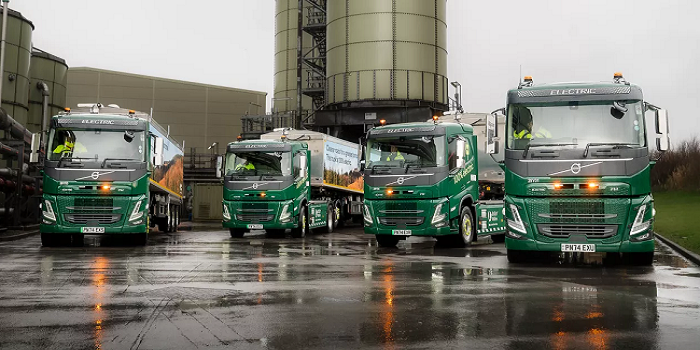
Four Volvo FM Electrics provide United Utilities with fully sustainable fleet solution United Utilities has added four new Volvo FM Electric 6x2 tractor units into its commercial vehicle fleet as the business pushes ahead with its ambitious decarbonisation targets.
The zero-tailpipe emission trucks, which replace outgoing diesel models, will be powered by electricity from CHP (combined heat and power) generators, which harness gas produced through United Utilities own anaerobic digesters, providing a fully sustainable fuel source.
A ‘Cleaner roads for a greener tomorrow’ strapline adorns each new truck, part of a specially designed livery that was created via an internal competition at the business.
John Blackmore, Head of Bioresource and Energy Operations at United Utilities, says: “As part of our sustainability and decarbonisation targets, United Utilities has set a challenging ambition to transition to an alternatively fuelled fleet. We have looked at a number of different alternative fuel types such as biomethane, hydrotreated vegetable oil (HVO) and now electric, undertaking trials, analysis and modelling to help inform what fits best for each of our different applications.
“Volvo has been a trusted partner in this process and the
new FM Electrics are the latest step on this journey. We can’t wait to see how
they bed in.”
United Utilities’ new arrivals form part of the ‘Electric
Freightway’ project led by GRIDSERVE and funded as part of the Department for
Transport and Innovate UK-backed Zero Emission HGV and Infrastructure
Demonstrator programme. The scheme will run until 2030 and aims to lay the
foundations for one of the biggest and most advanced charging networks designed
specifically for electric trucks, while also building an evidence base on which
zero emission HGV technology is better suited for specific use-cases.
Supplied by Paul McNicholas, Customer Solutions Manager
at Thomas Hardie Commercials, the FM Electrics feature the maximum six
batteries, as well as three electrical motors generating an output of 666 hp
and 2,400 Nm of continuous torque.
Paired with a standard I-Shift gearbox to create a smooth
and ultra-quiet in-cab driving experience, this impressive performance is
handled by an electromobility traction control system to help manage power
output on slippery surfaces. Different drive modes are also available to set
desired performance, comfort and energy usage levels.
Each electric tractor unit will be paired with a bulk
tipping trailer. They offer a range of approximately 300 km on a single charge,
which is more than enough for United Utilities’ selected operations –
collecting sludge cake from regional dewatering feeder sites and transporting
the loads back to the firm’s Manchester Bioresource Centre for anaerobic
digestion.
“Our sites, located across the North West, are accessed
by different road networks and geography which provides a good test bed for the
electric trucks,” adds Blackmore. “The trucks will be double shifted, working
up to seven days a week. They will have access to recharging points at our
flagship Manchester site 24 hours a day.”
United Utilities has specified each truck with a Volvo Connect
subscription, providing access to a host of digital and connected services via
a user-friendly portal through which the business can access a wealth of data
to help analyse fleet operation to ensure optimal vehicle performance.
The FM Electrics – which are expected to clock-up in the
region of 75,000 miles annually – are covered by a comprehensive Volvo Gold
Contract to guarantee maximum uptime. This includes preventative maintenance
and repairs, plus the monitoring of key systems such as batteries and other
critical components.
United Utilities’ Bioresources Services
Team transport 2,000,000m3 of liquid sludge and around 400,000 tonnes of sewage
sludge cake each year. Sludge is moved from the company’s 569 wastewater
treatment works to one of its 37 bioresource treatment facilities where
digestion technology is used to produce high energy fertiliser that is then
distributed to farms across the country.
For more truck related news log onto www.truckslife.com/news
